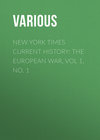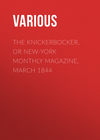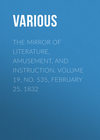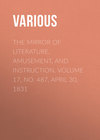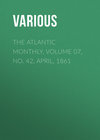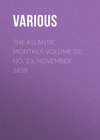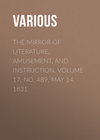Loe raamatut: «New York Times Current History: The European War, Vol 1, No. 1», lehekülg 10
Comment by Readers of Shaw
Shaw Has Made Minister von Jagow's Remark on a "Scrap of Paper" Understandable.
To the Editor of The New York Times:
Most hearty thanks for that masterly "common-sense" article of Bernard Shaw. How clearly he expresses the much that many of us have felt way down inside and have not been able to formulate even to ourselves!
He has made at least one woman—and one of German parentage at that—understand what reams of public and private communications from all over the Fatherland could not make clear: just why the blunt, impetuous, shocked, and astounded Kaiser dared give utterance to that disgraceful "scrap of paper" remark—inexcusable but also very understandable in the light of his knowledge of and confidence in a more astute miscreant; why France and Germany have always considered England more or less of a Tartuffe and a "Scheinheilige" (one who seems holy); and why every German—man, woman and child—so execrates Sir Edward Grey and colleagues.
Nothing in all the sickening present conditions, the future long-lasting woe and misery, the barbarous neutrality violations has so made me blush for my mother's country as the "scrap of paper" incident; and it has been most bitter to listen to the extravagant, fantastic eulogies on England, with which we've been so favored without feeling honestly able to make any excuses whatever for Germany.
But now—thanks to that article—I can understand what I may not condone, and, though abhorring the Kaiser and my mother's compatriots for their share in that horror going on abroad, I can also pity the hot-headed, imperfect mere man going to war under a carefully incited and fostered misapprehension, and need no longer glorify the cool-headed, sapient policy which so cleverly duped ruler and people.
Not since the war began have I felt so undepressed, so free to sympathize where I so love, so free from having to commend those for whom I feel no love whatever. For all of which accept the warmest thanks of
KATE HUDSON.
New York, Nov. 17.
Shaw Article Work of "Farceur."
To the Editor of The New York Times:
"Common sense and Shaw!" Shaw begins his article by saying, "I am giving my views for what they are worth, with a malicious bias." Later on he says: "I am writing history." Toward the end, after having obscured with words many things which had hitherto been clear to most people, he says: "Now that we begin to see where we really are, &c." How Shavian!
There are at least two sides to all questions, and so long as they are reasonably presented one is glad to hear them even if they fail to convince, but when a farceur is allowed to occupy three whole pages usually filled by serious and interesting writers it seems time to protest. The subject itself is not one for easy paradox or false and flippant epigram.
Mr. Shaw says he does not hold his tongue easily. He certainly does not, and when it wags it wags foolishly, and, as he admits, maliciously, albeit sometimes amusingly, and with superficial brilliance. He says the Irish do not consider England their country yet. Of course they do not. Why should the Irish consider themselves English? Neither do the Scots, nor the Welsh, nor the Canadians, nor will they ever so think. But they are all British, and so, despite all Mr. Shaw says to the contrary, Kitchener was right.
Mr. Shaw falls into a common and regrettable error when he continually writes England when he really means the British Empire. It is the British Empire that is at war, for which, though a citizen, Mr. Shaw has no authority to speak or to be considered a representative, for, as he unnecessarily admits, he is not a "British patriot"; neither is he a "Junker," for I have looked through all his definitions of the word, and none applies to him.
In what way is the "Battle of Dorking" like Bernhardi? The one he says had as a moral: "To arms! or the Germans will besiege London!" The other said: "To arms! so that the Germans may besiege London, or any other country that does not want compulsory culture!" The one was defensive, the other offensive.
He says of the war: "We" began it. Since he says he is not English, and that it is an English war, whom does he mean by "We"? If he means the British, then, should a policeman see a small boy being ill-treated by a large man and go to the help of that boy, he, the policeman, must be said to have begun the fight which would probably ensue between him and said man, notwithstanding that the policeman is only fulfilling what he has sworn to do.
Monaco, he says, "seems to be, on the whole, the most prosperous and comfortable State in Europe." If this is buffoonery it is singularly out of place. But even Monaco has an "army," has had recently a small revolution, and the Monegasques do not consider themselves ideally comfortable, and they have many "injustices." Does he hold the principality up as a model administration and the source of its prosperity as above reproach?
Mr. Shaw represents no one but himself, and, like all small men, he reviles others greater than he, such as Sir Edward Grey and Mr. Asquith, but it does not become him, looking at his own life's history, to cast cheap sneers at anonymous journalists in cheap newspapers, who, though they may lack his literary style, possess, at least, one virtue which he boasts that he has not—patriotism! Yours very truly,
LAWRENCE GRANT.
New York, Nov. 18.
Antidote to "Long Infliction of Dreary Stuff."
To the Editor of The New York Times:
Hail to Bernard Shaw! Could anything be more refreshing? After the long infliction upon us of the flood of dreary stuff from London and Paris, and all the talk of German militarism, and what is to become of it at the hands of such immaculately unmilitary apostles of peace and international righteousness and treaty observances as Russia, France, and England, and all the maudlin denunciations of the German Nietzsche and Bernhardi, and the terrible Kaiser, could anything be more refreshing than Shaw's advent in the field of current war history?
Though an Anglo-Saxon of American birth and long descent, and no believer in militarism of any sort of itself, yet I see in that no reason to distort ancient history by an attempt to make it appear that German militarism is at all the chief sinner, or, for that matter, not a very necessary and desirable thing in order that Germany may have her rightful place in the world, or any place at all.
V.A.W. Warwick, N.Y., Nov. 16.
False Assumptions Basis of Shaw's Attack.
To the Editor of The New York Times:
The article on the European war by Mr. G.B. Shaw in THE TIMES of Sunday appeals to me as a noteworthy specimen of what an artful literary genius can do in the way of argumentative cantankerousness. His chief grievance is British diplomacy as represented by Sir Edward Grey, upon whose devoted head he empties the vials of his splenetic humor.
Underlying his argument are two glaringly false assumptions, and on these the whole fabric rests. The first is that a certain undefined but presumably multitudinous body, which he designates as "Socialist," "Democratic," and "Social Democratic," is better qualified to determine the policy and conduct the correspondence of the Foreign Office than trained and experienced statesmen.
The second is that Sir Edward Grey should have followed the suggestion of Sazonof and threatened Germany with war at a certain stage of the correspondence. This can now be only a matter of opinion, but it may be confidently affirmed that of all nations the Germany of this day would be the last to back down in face of a threat. It may be also said generally that an open threat is about the surest way to bring on a war. Austria threatened Servia and war ensued. Germany threatened Russia and war ensued. Germany threatened Belgium—in the form of a notification that she intended to invade her territory—and war ensued.
Mr. Shaw's contentions are grotesque.
Flushing, Nov. 16. SAM TEST.
"Junkers" Controlled Old World Ages Before Shaw.
To the Editor of The New York Times:
With regard to the article by Mr. Bernard Shaw, the gist of the matter can be compressed in fewer words. The ideas expressed are not the exclusive property of Mr. Shaw. The Old World for indefinite ages has been controlled and directed by what he calls the "Junker" class, the rich and idle aristocrats who want for nothing, and, being born to rule, do not find it worth while to exert themselves mentally, and for whom there is no suitable profession but the army and diplomacy.
The mass of the people are to them the great unwashed, and those a little higher in the scale "cads and bounders," or the German equivalent, in fact the canaille of the French who at the time of the Revolution took things into their own hands to the great surprise of everybody. This substratum is not considered in the scheme of the "Junker's" existence, though the lower orders alone are the workers and producers and make ease and luxury possible.
Mr. Shaw. I believe, intends to intimate that there might be a use for the intellectual class, the thinkers and writers with the imagination that can put them mentally in the place of the individuals who make up the masses, think the thoughts and live the lives vicariously of the people who are the nation, and if the "Junker" class of England and Germany and kindred nations who govern and dictate its policies were leavened with the brains and broad-mindedness of the thinkers there might be found a better use for men than killing each other and a brighter outlook for the world which is now filled with widows and orphans.
Mrs. F.B. WILLIAMSON.
Elizabeth, N.J., Nov, 16.
Open Letter to President Wilson 1
By George Bernard Shaw
Sir: I petition you to invite the neutral powers to confer with the United States of America for the purpose of requesting Britain, France, and Germany to withdraw from the soil of Belgium and fight out their quarrel on their own territories. However the sympathies of the neutral States may be divided, and whatever points now at issue between the belligerent powers may be doubtful, there is one point on which there can be neither division nor doubt, and that is that the belligerent armies have no right to be in Belgium, much less to fight in Belgium, and involve the innocent inhabitants of that country in their reciprocal slaughter. You will not question my right to address this petition to you. You are the official head of the nation that is beyond all question or comparison the chief of the neutral powers, marked out from all the rest by commanding magnitude, by modern democratic constitution, and by freedom from the complication of monarchy and its traditions, which have led Europe into the quaint absurdity of a war waged formally between the German Kaiser, the German Czar, the German King of the Belgians, the German King of England, the German Emperor of Austria, and a gentleman who shares with you the distinction of not being related to any of them, and is therefore describable monarchically as one Poincaré, a Frenchman.
I make this petition on its merits, without claiming any representative character except such as attaches to me as a human being. Nobody here has asked me to do it. Except among the large class of constitutional beggars, the normal English feeling is that it is no use asking for a thing if you feel certain that it will be refused, and are not in a position to enforce compliance. Also, that the party whose request is refused and not enforced looks ridiculous. Many Englishmen will say that a request to the belligerents to evacuate Belgium forthwith would be refused; could not be enforced; and would make the asker ridiculous. We are, in short, not a prayerful nation. But to you it will be clear that even the strongest power, or even allied group of powers, can have its position completely changed by an expression of the public opinion of the rest of the world. In your clear western atmosphere and in your peculiarly responsible position as the head centre of western democracy, you, when the European situation became threatening three months ago, must have been acutely aware of the fact to which Europe was so fatally blinded—namely, that the simple solution of the difficulty in which the menace of the Franco-Russo-British Entente placed Germany was for the German Emperor to leave his western frontier under the safeguard of the neighborliness and good faith of American, British, and French democracy, and then await quite calmly any action that Russia might take against his country on the east. Had he done so, we could not have attacked him from behind; and had France made such an attack—and it is in the extremest degree improbable that French public opinion would have permitted such a hazardous and unjustifiable adventure—he would at worst have confronted it with the fullest sympathy of Britain and the United States, and at best with their active assistance. Unhappily, German Kings do not allow democracy to interfere in their foreign policy; do not believe in neighborliness; and do believe in cannon and cannon fodder. The Kaiser never dreamed of confiding his frontier to you and to the humanity of his neighbors. And the diplomatists of Europe never thought of that easy and right policy, and could not suggest any substitute for it, with the hideous result which is before you.
The State of Belgium.
Now that this mischief has been done, and the two European thunderclouds have met and are discharging their lightnings, it is not for me to meddle with the question whether the United States should take a side in their warfare as far as it concerns themselves alone. But I may plead for a perfectly innocent neutral State, the State of Belgium, which is being ravaged in a horrible manner by the belligerents. Her surviving population is flying into all the neighboring countries to escape from the incessant hail of shrapnel and howitzer shells from British cannon, French cannon, German cannon, and, most tragic of all, Belgian cannon; for the Belgian Army is being forced to devastate its own country in its own defense.
For this there can be no excuse; and at such a horror the rest of the world cannot look on in silence without incurring the guilt of the bystander who witnesses a crime without even giving the alarm. I grant that Belgium, in her extreme peril, made one mistake. She called to her aid the powers of the Entente alone instead of calling on the whole world of kindly men. She should have called on America, too; and it is hard to see how you could in honor have disregarded that call. But if Belgium says nothing, but only turns her eyes dumbly toward you while you look at the red ruin in which her villages, her heaps of slain, her monuments and treasures are being hurled by her friends and enemies alike, are you any the less bound to speak out than if Belgium had asked you to send her a million soldiers?
Not for a moment do I suggest that your intervention should be an intervention on behalf of either the Allies or the Entente. If you consider both sides equally guilty, we know that you can find reasons for that verdict. But Belgium is innocent; and it is on behalf of Belgium that so much of the world as is still at peace is waiting for a lead from you. No other question need be prejudged. If Germany maintains her claim to a right of way through Belgium on a matter which she believed (however erroneously) to be one of life and death to her as a nation, nobody, not even China, now pretends that such rights of way have not their place among those common human rights which are superior to the more artificial rights of nationality. I think, for example, that if Russia made a descent on your continent under circumstances which made it essential to the maintenance of your national freedom that you should move an army through Canada, you would ask our leave to do so, and take it by force if we did not grant it. You may reasonably suspect, even if all our statesmen raise a shriek of denial, that we should take a similar liberty under similar circumstances in the teeth of all the scraps of paper in our Foreign Office dustbin. You see, I am frank with you, and fair, I hope, to Germany. But a right of way is not a right of conquest; and even the right of way was not, as the Imperial Chancellor imagined, a matter of life and death at all, but a militarist hallucination, and one that has turned out, so far, a military mistake. In short, there was no such case of overwhelming necessity as would have made the denial of a right of way to the German Army equivalent to a refusal to save German independence from destruction, and therefore to an act of war against her, justifying a German conquest of Belgium. You can therefore leave the abstract question of international rights of way quite unprejudiced by your action. You can leave every question between the belligerents fully open, and yet, in the common interest of the world, ask Germany to clear out of Belgium, into France or across the Channel, if she can, back home if she can force no other passage, but at all events out of Belgium. A like request would, of course, be addressed to Britain and to France at the same time. The technical correctness of our diplomatic position as to Belgium may be unimpeachable; but as the effect of our shells on Belgium is precisely the same as that of the German shells, and as by fighting on Belgian soil we are doing her exactly the same injury that we should have done her if the violation of her neutrality had been initiated by us instead of by Germany, we could not decently refuse to fall in with a general evacuation.
A Certain Result of Intervention.
At all events, your intervention could not fail to produce at least the result that even if the belligerents refused to comply, your request would leave them in an entirely new and very unpleasant relation to public opinion. No matter how powerful a State is, it is not above feeling the vast difference between doing something that nobody condemns and something that everybody condemns except the interested parties.
That difference alone would be well worth your pains. But it is by no means a foregone conclusion that a blank refusal would be persisted in. Germany must be aware that the honor of England is now so bound up with the complete redemption of Belgium from the German occupation that to keep Antwerp and Brussels she must take Portsmouth and London. France is no less deeply engaged. You can judge better than I what chance Germany now has, or can persuade herself she has, of exhausting or overwhelming her western enemies without ruining herself in the attempt. Whatever else the war and its horrors may have done or not done, you will agree with me that it has made an end of the dreams of military and naval steam-rollering in which the whole wretched business began. At a cost which the conquest of a whole continent would hardly justify, these terrible armaments and the heroic hosts which wield them push one another a few miles back and forward in a month, and take and retake some miserable village three times over in less than a week. Can you doubt that though we have lost all fear of being beaten, (our darkened towns, and the panics of our papers, with their endless scares and silly inventions, are mere metropolitan hysteria,) we are getting very tired of a war in which, having now re-established our old military reputation, and taught the Germans that there is no future for their empire without our friendship and that of France, we have nothing more to gain? In London and Paris and Berlin nobody at present dares say "Sirs, ye are brethren; why do ye wrong one to another?"; for the slightest disposition toward a Christian view of things is regarded as a shooting matter in these capitals; but Washington is still privileged to talk common humanity to the nations.
An Advantage of Aloofness.
Finally, I may remind you of another advantage which your aloofness from the conflict gives you. Here, in England and in France, men are going to the front every day; their women and children are all within earshot; and no man is hard-hearted enough to say the worst that might be said of what is going on in Belgium now. We talk to you of Louvain and Rheims in the hope of enlisting you on our side or prejudicing you against the Germans, forgetting how sorely you must be tempted to say as you look on at what we are doing, "Well, if European literature, as represented by the library of Louvain, and European religion, as represented by the Cathedral of Rheims, have not got us beyond this, in God's name let them perish." I am thinking of other things—of the honest Belgians, whom I have seen nursing their wounds, and whom I recognize at a glance as plain men, innocent of all warlike intentions, trusting to the wisdom and honesty of the rulers and diplomatists who have betrayed them, taken from their farms and their businesses to destroy and be destroyed for no good purpose that might not have been achieved better and sooner by neighborly means. I am thinking of the authentic news that no papers dare publish, not of the lies that they all publish to divert attention from the truth. In America these things can be said without driving American mothers and wives mad; here, we have to set our teeth and go forward. We cannot be just; we cannot see beyond the range of our guns. The roar of the shrapnel deafens us; the black smoke of the howitzer blinds us; and what these do to our bodily senses our passions do to our imaginations. For justice, we must do as the mediaeval cities did—call in a stranger. You are not altogether that to us; but you can look at all of us impartially. And you are the spokesman of Western democracy. That is why I appeal to you.
G. BERNARD SHAW.
We are glad to publish Mr. Shaw's brilliant appeal to the President of the United States, because we believe that when the time for settlement arrives, the influence of America will be a powerful, perhaps a decisive, factor in obtaining it. We agree, too, with him that while she is not likely to respond to an appeal to intervene on the side of the Entente or the Alliance, the case of Belgium, the innocent victim of the war, is bound to find her in a very different mood. The States are already Belgium's almoner; it is only a step further for them to come in as her savior. But on a vital point we disagree with Mr. Shaw. His Irish mind puts the case with an indifference to which we cannot pretend. We have got to save Western Europe from a victory of Prussian militarism, as well as to avenge Belgium and set her on her feet again. We regard the temper and policy revealed in Germany's violation of Belgium soil and her brutalization of the Belgian people as essential to our judgment of this war and its end. And we dare not concede an inch to Mr. Shaw's "right of way" theory. His distinction between "right of way" and a "right of conquest" has no practical effect other than to extinguish the rights of small nationalities as against great ones, who alone have the power to take a "right of way" when it is refused, and afterward to turn it into a right of conquest. Germany's action was not only a breach of her own treaty (only revealed within a few hours of its execution), but of Article I. of The Hague Convention on the rights of neutral powers:
"THE TERRITORY OF NEUTRAL POWERS IS INVIOLABLE."
It is not therefore a small thing that Germany has ripped clean through the whole fabric of The Hague Conventions of 1907. Could the American Government, aware of that fact, address herself to intervention on the Belgian question without regard to the breaches of international law which were perpetrated, first, through the orignal German invasion of Belgium, and then in the conduct of the campaign in that country?
